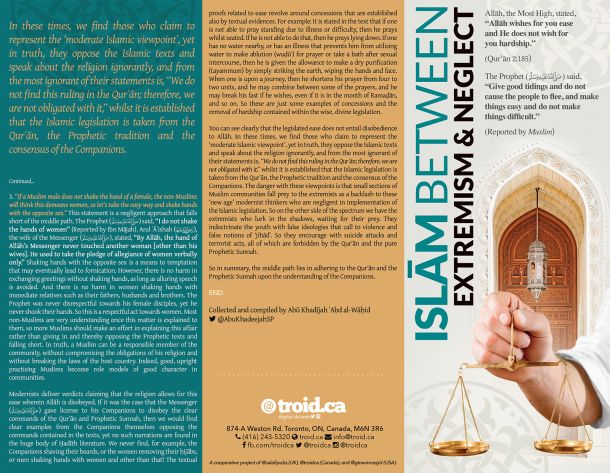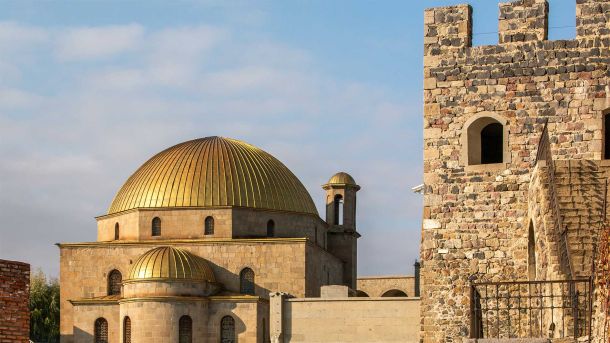News Archive
Jun 20, 2016
https://www.troid.org/wp-content/uploads/2016/06/extremismneglect.pdf
Islām Between Extremism & Neglect
In these times, we find those who claim to represent the ‘moderate Islamic viewpoint’, yet in truth, they oppose the Islamic texts and speak about the religion ignorantly, and from the most ignorant of their statements is, “We do not find this ruling in the Qurʾān; therefore, we are not obligated with it,” whilst it is established that the Islamic legislation is taken from the Qurʾān, the Prophetic tradition and the consensus of the Companions
Shaykh Abū Khadījah
Jun 20, 2016
The Ruling on Utilising Medication in the Month of Ramaḍān to Prevent the Onset of Menses
[Q]: What is the ruling on using medication solely in the month of Ramaḍān to prevent [the onset of] menses in order to fast the entire month?
[A]: Allāh has allowed women to break their fast during the days of their menses and postnatal bleeding, and indeed, the Prophet (صلى الله عليه وسلم) said: “I have not seen anyone more deficient in intelligence and religion than you. A cautious sensible man could be led astray by some of you.” They asked: “What is deficient in her intelligence and religion?” He said: “As for her deficiency in intelligence, then verily, Allāh has made the witness of tw…
Jun 12, 2016
Injections, Blood Tests and Ḥijāmah While Fasting
[Q]: What is the ruling on a fasting person getting injected with a needle in his vein or his muscle and what is the difference between the two?
[A]: That which is most correct is that they do not break one’s fast, however injecting oneself with a needle from which nutrition is gained does break the fast. Likewise, one’s fast is not broken due to a blood test because it is not like ḥijāmah (cupping). The most correct position of the scholars is that ḥijāmah breaks the fasts of both the doer and the one it is being done to according to the statement of the Prophet (صلى الله عليه وسلم):
Both…
Jun 11, 2016
Advice to Young Students Going Overseas – It Can Make or Break You
In the Name of Allāh, the Ever Merciful, the Bestower of Mercy
In the farewell admonition form the seminar: Be in this World as a Stranger, Abū Idrīs addresses the following question:
[Q]: What is your advice regarding young students who are studying overseas or will go to study, considering that ṭalib al-ʿilm (seeking knowledge) is something that seems to either make or break a person. So, either these students go over to study and are with the people of Sunnah and are united or sometimes, they are with the people who oppose the Sunnah. Due to the fact that you were in al-Madīnah for a n…
Jun 11, 2016
Farewell Admonition (Be in This World as a Stranger)
There is, right from the beginning of this brief address to our Salafī brothers and sisters who attended this conference, and to the listeners of it’s audio recording, a fine example of the love and concern we of Ahl al-Sunnah should have for one another. Knowledge, which is the weapon of a believer, and a cause for the increase of one’s Īmān is spoken about by our beloved brother and Ustādh Abū Ḥakīm Bilāl Davis. It is of extreme importance that the Sunnī arms his or herself with beneficial knowledge. Allāh says in His Glorious Qurʾān that He raises in levels those who possess knowledge…
Jun 10, 2016
Standing in Prayer
The Muḥaddith, al-Albānī [d. 1419 AH], may Allāh have mercy upon him, wrote:1
6. A person must stand in prayer, it is a rukn for all except:
i. Those engaged in ṣalāt al-khawf2 and intense combat. Under such circumstances, they are permitted to pray while riding.
ii. The indisposed who are not able to stand. They are to pray seated while they can. If not, they are to recline on one side.
iii. Those offering al-nawāfil. They either pray while riding or if they prefer while sitting. They bow and prostrate by gesturing with their head, making the sujūd lower than the rukūʿ. This applies to t…








